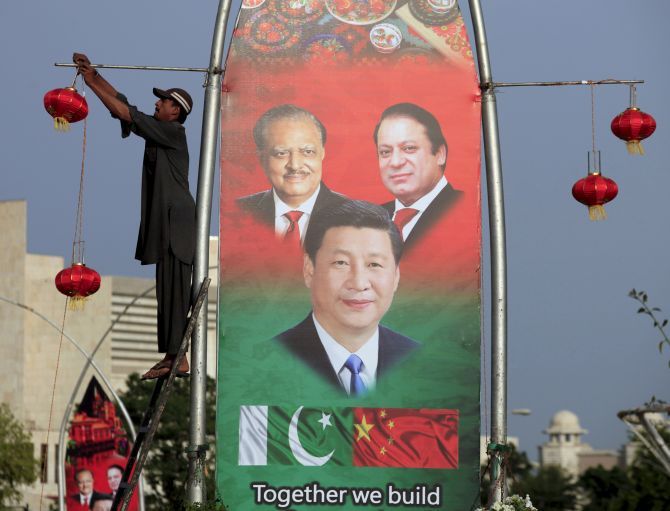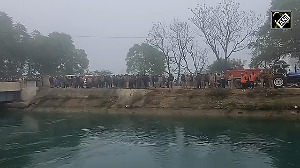 Defending its nuclear cooperation with its close ally Pakistan, China on Thursday said its supply of reactors to Islamabad were in accordance with the principles of National Security Guard and under the supervision of United Nations nuclear watchdog.
Defending its nuclear cooperation with its close ally Pakistan, China on Thursday said its supply of reactors to Islamabad were in accordance with the principles of National Security Guard and under the supervision of United Nations nuclear watchdog.
Refuting a US think tank report which said that China’s nuclear cooperation with Pakistan was in contravention with the Nuclear Suppliers Group principles, Chinese foreign ministry spokesperson, Hua Chunying said China-Pakistan cooperation is in accordance with the 48-member nuclear club, which supervises global nuclear commerce.
“China has stated on many occasions that the cooperation between China and Pakistan in the civil nuclear energy sector is completely for peaceful purpose,” Hua said.
“Such cooperation is subject to the safeguards and supervision of the International Atomic Energy Agency and in accordance with the NSG’s principles and the international obligations assumed by the two countries,” Hua said.
The Arms Control Association has expressed concern over export of nuclear materials by China to Pakistan saying that it is in violation of international norms and established procedures.
“China has taken significant steps over the past several years to strengthen its export controls. However, Beijing’s decision to continue selling nuclear reactors to Pakistan in contravention of NSG and its sales of missile technologies to countries of concern earns China a failing grade,” the ACA report said.
In its updated report card 2013-2016 ‘Assessing Progress on Nuclear Nonproliferation and Disarmament’, ACA gave China a failing “F Grade” on nuclear weapons related export control.
China had joined the NSG in 2004 and its national export controls include provisions related to export licensing, control lists, end-user controls, and import controls.
At the International Atomic Energy Agency General Conference in 2015, China had said it carried out “stringent reviews” on its export controls and adjusts its trigger lists according to technical progress.
In March 2016, Beijing said it started to implement the Nuclear Export Control List that was updated in January 2016.
“Despite progress on its export controls China continues to supply Pakistan with nuclear power reactors, despite objections that the sale of the reactors did not receive a consensus exemption from the NSG,” the report said.
“Pakistan, which is neither an Non-Proliferation Treaty member nor under full-scope IAEA safeguards, is therefore ineligible to receive such assistance under NSG rules,” it argued.
ACA observations about the consensus and NPT were significant as China blocked India’s application to join NSG in the recent NSG Plenary meeting in Seoul despite the support of majority of its members, saying that it lacked the mandatory requirement of consensus among the group.
China also said India was not a signatory to NPT, yet another obligatory requirement to join the NSG.
In defence of its continued supply of nuclear reactors to Pakistan, China argues that they were part of the decision reached before it joined the NSG.
“China has argued that the reactor transfer was based on a contract negotiated with Pakistan in 2003, one year before Beijing joined the NSG, and grandfathered in when China joined the regime,” the ACA report said.
“However, the 2003 exemption was widely understood to apply solely to the two nuclear power reactors whose sale was completed before China’s acceptance into the NSG in 2004,” the report said.
In February 2015, Wang Xiaotao, vice-minister of the China’s planning body the National Development and Reforms Commission said China had assisted Pakistan to build six nuclear reactors with a total installed capacity of 3.4 million kws amid Beijing’s plans to build two 1100 mw reactors in Karachi with $6.5 billion assistance.
It was the first detailed disclosure by a Chinese official about China’s supply of reactors to Pakistan which remained under wraps for long.
China had built two 300 mw reactors at Chasma in Punjab followed by two 320 mw units at the same place.
It is currently building two 1100 mw reactors in Karachi at a cost of $6.5 billion, saying they are aimed at easing power problems in Pakistan.
India and the US have expressed concerns over it and said the reactors were being built without the sanction of the NSG.
While India has secured the NSG waiver after the India-US civil nuclear deal in 2008 to get more nuclear reactors and fuel, Pakistan has not got any such exemption.
China which is rapidly expanding its nuclear reactors domestically to reduce dependence on coal is now aggressively marketing its newly acquired nuclear technology to build 1100 mw reactors abroad.
Besides Pakistan, China signed an agreement to build a pressurised water reactor nuclear power plant in Argentina.
“It did not take long for us from introducing this (nuclear) technology to exporting it,” Wang said.
According to a report released last year, China had 27 nuclear power generating units in operation as of the end of October 2015, with a total installed capacity of 25.5 gigawatts, while another 25 units with a total installed capacity of 27.51 GW under construction.
The world’s second largest economy plans to raise its installed nuclear power capacity to 58 GW with an additional 30 GW under construction by 2020 and build itself into a strong nuclear power country by 2030.











 © 2025
© 2025